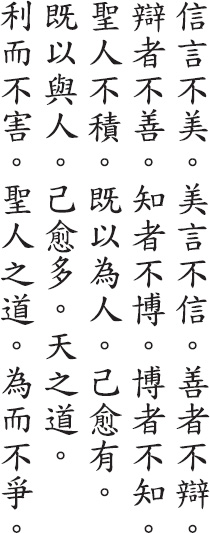81
 |
True words aren’t beautiful beautiful words aren’t true the good aren’t eloquent the eloquent aren’t good the wise aren’t learned the learned aren’t wise sages accumulate nothing but the more they do for others the greater their existence the more they give to others the greater their abundance the Way of Heaven is to help without harming the Way of the Sage is to act without struggling |
HUANG-TI says, “There’s a word for everything. Words that are harmful we say aren’t true” (Chingfa: 2).
TE-CH’ING says, “At the beginning of this book, Lao-tzu says the Tao can’t be put into words. But are its 5,000-odd characters not words? Lao-tzu waits until the last verse to explain this. He tells us that though the Tao itself includes no words, by means of words it can be revealed—but only by words that come from the heart.”
SU CH’E says, “What is true is real but nothing more. Hence, it isn’t beautiful. What is beautiful is pleasing to look at but nothing more. Hence, it isn’t true. Those who focus on goodness don’t try to be eloquent. And those who focus on eloquence aren’t good. Those who have one thing that links everything together have no need of learning. Those who keep learning don’t understand the Tao. The sage holds on to the one and accumulates nothing.”
HO-SHANG KUNG says, “True words are simple and not beautiful. The good cultivate the Tao, not the arts. The wise know the Tao, not information. Sages accumulate virtue, not wealth. They give their wealth to the poor and use their virtue to teach the unwise. And like the sun or moon, they never stop shining.”
CHUANG-TZU says, “When Lao Tan and Yin Hsi heard of people who considered accumulation as deficiency, they were delighted” (Chuangtzu: 33.5). Lao Tan was Lao-tzu’s name, and Yin Hsi was the man to whom he transmitted the Taoteching.
SUNG CH’ANG-HSING says, “People only worry that their own existence and abundance are insufficient. They don’t realize that helping and giving to others does them no harm but benefits themselves instead.”
TS’AO TAO-CH’UNG says, “The wealth that comes from giving generously is inexhaustible. The power that arises from not accumulating is boundless.”
WU CH’ENG says, “Help is the opposite of harm. Wherever there is help, there must be harm. But when Heaven helps, it doesn’t harm, because it helps without helping. Action is the start of struggle. Wherever there is action, there must be struggle. But when sages act, they don’t struggle, because they act without acting.”
CHIAO HUNG says, “The previous 5,000 words all explain ‘the Tao of not accumulating,’ what Buddhists call ‘nonattachment.’ Those who empty their mind on the last two lines will grasp most of Lao-tzu’s text.”
WANG CHEN says, “The last line summarizes the entire 5,000 words of the previous eighty verses. It doesn’t focus on action or inaction but simply on action that doesn’t involve struggle.”
At the beginning and at the end of the Taoteching, Lao-tzu reminds us not to become attached to the words. Let the words go. Have a cup of tea. In lines three and four, the Fuyi edition adds yen (words). In the Mawangtui texts, lines three and four are inverted with lines five and six. I haven’t used either of these variants, nor have I accepted the variation of the penultimate line introduced by Mawangtui B and the Suotan edition, both of which have jen (man) in place of sheng-jen (sage). This would result in “the Way of Humankind,” which does appear in verse 77, but in a pejorative sense. This verse is not present in the Kuotien texts.